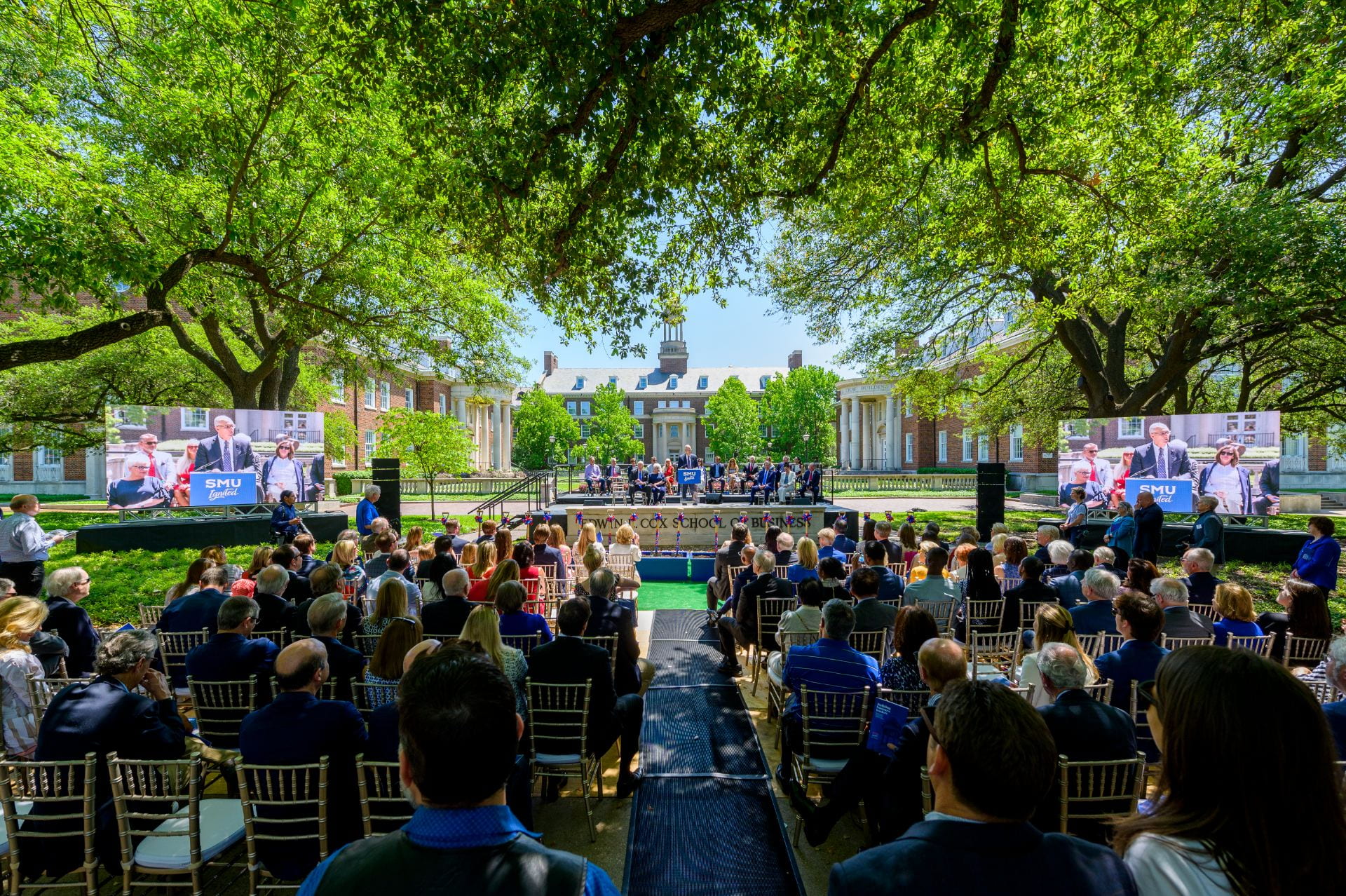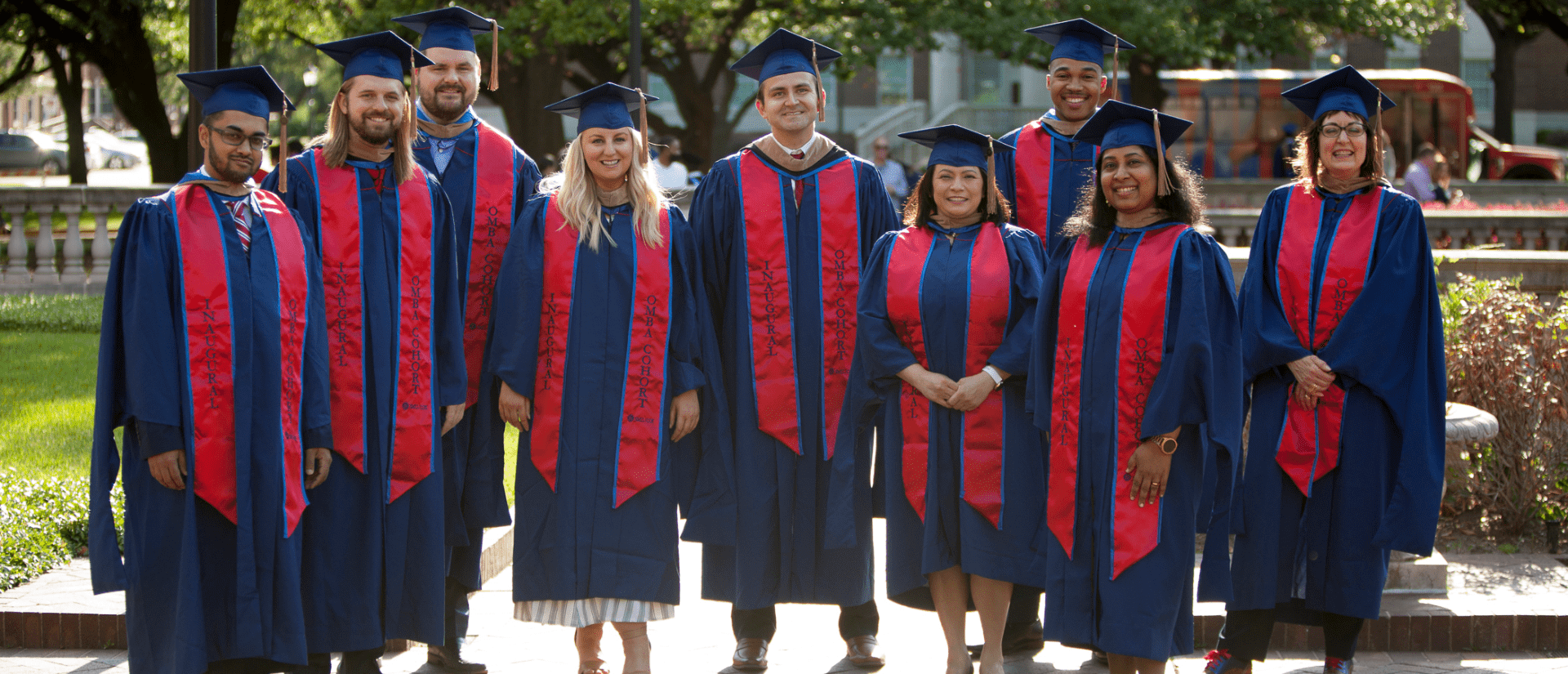Professors with real-world experience offer invaluable expertise to their students, and in the business law department at SMU Cox School of Business, there is no shortage of that firsthand experience among faculty members. The three longest-serving business law course lecturers — Barbara Kincaid, Clay Small and Catherine Weber — went to law school and were practicing lawyers before becoming teachers, and in the end, it is the students who benefit.
“Every single corporate attorney on the planet believes they could be a good teacher of business law,” says Cox Associate Dean of Undergraduate Programs Jim Bryan. “But there’s a reason why there’s not a ton of them out there. Our business law faculty are able to step outside of the corporation and look at other areas. They have the experience of someone who is looking both at how the corporation is run and also at the legal and governmental regulatory laws, and how students can use those rules to benefit the corporation.”
Why is taking a law course within business so important? Whether a student is an entrepreneur starting a business or joining the ranks of a corporate giant, they need to understand how regulation and the law impact business development. “Students have an idea to start a company, but they may not be thinking about the legal and regulatory framework that goes around that,” Bryan says. “What this business law class does is give them a window into that world.”
Meet the longtime business law lecturers who are putting their legal education and real-world experience to use in the classroom to benefit SMU Cox students.
Barbara Kincaid
Adjunct Professor in Business Law
LLM, SMU Dedman School of Law
JD, SMU Dedman School of Law
BA, Mathematics, SMU Dedman College of Humanities and Sciences
Barbara Kincaid has always had teaching in her blood; after earning her undergraduate mathematics degree from SMU, she was certified to teach high school math. But after pivoting and working for Xerox, she decided to leverage her client-facing skills in the legal field — and went to law school at SMU Dedman School of Law. Still an educator at heart, Kincaid began teaching business law at SMU Cox nearly three decades ago. “Though robust substantive business law information is provided,” she says of her pedagogical approach, “the classroom and writing experiences are about addressing potential legal issues through building effective relationships based on character, communication and competency.”
She helps future business leaders understand how to take care of their employees best, create a positive culture and focus on modern corporate governance, including the three “Ps”: profit, people, and the planet. Kincaid leans on her broad background to cover a wide range of topics with real-world examples, including environmental compliance, intellectual property and real estate fundamentals. “I spend time on white-collar crime because I don’t want these good people going to the penitentiary,” she says. “And I don’t want their companies to be branded as criminal.”
This year, after 29 devoted years teaching in the Cox School, Kincaid is taking a step back from being a senior lecturer and has moved into an adjunct professor role, which is how she first began her career on campus. With her students in mind, she recommended a longtime practicing attorney to begin sharing her course load last year. Jim Chester, a technology and business attorney for innovation-based entrepreneurs and companies, also happens to have 20 years of experience as an adjunct professor of law at other area universities. Meanwhile, Kincaid is committed to keeping her own focus on being the best professor she can be. “This is my life’s work,” she says.
Barbara has earned 16 awards for outstanding BBA and MBA teaching as well as the Distinguished BBA Instructor award, the Willis M. Tate award and recognition as Rotunda Outstanding faculty, among other teaching awards. She served as a Visiting Professor of Law at Marie Curie Skladowska University in Poland, lectured to EMBA students at Budapest University of Economics and Technology and taught at SMU-in-Oxford. Kincaid has served as academic advisor to multiple graduate and undergraduate students at Cox and throughout the University. She continues to serve on the board of SMU’s Center for Faith and Learning.
Clay Small
Adjunct Professor in Business Law
JD, SMU Dedman School of Law
BA, English, Ohio Wesleyan University
There are few lawyers with more corporate experience than Clay Small, who worked for PepsiCo Inc. for 30 years, eventually serving as PepsiCo’s senior vice president and managing attorney. He lived within walking distance of SMU’s campus but was teaching part time at Wake Forest University. When he retired from Pepsi, he joined the SMU Cox faculty in 2011, at the behest of then SMU Cox Dean Al Niemi.
With decades of experience at PepsiCo and on Wall Street, Small emphasizes students’ ability to write clearly and persuasively — a skill he practiced while writing his forthcoming second novel. He isn’t trying to turn the students into lawyers, but he knows how important communication can be. “People in the business world don’t want to see long, drawn-out arguments,” he says. “They want to see persuasive, concise arguments of your position.”
Transitioning from high-powered corporate lawyer to university professor came with its challenges. Small learned from excellent faculty at SMU Cox and even created, along with Associate Dean and Professor of Practice Gary Moskowitz, a class from scratch about American business through the lens of General Motors. In addition to using numerous concrete examples from his extensive career, he highlights the need to collaborate, a direct lesson from his experience in the corporate world. “Whether it’s flying in the corporate jet or evaluating a merger, the need to work as a team is something that I try to convey to students,” he says, “so when they see an issue, they will feel comfortable raising it with their teammates.”
Catherine Weber
Senior Lecturer in Business Law
JD, SMU Dedman School of Law
BBA, SMU Cox School of Business
Catherine Weber received her BBA, with emphases in accounting and finance, from SMU Cox. Then, after working in banking for a short time, she returned to SMU Dedman School of Law. After receiving her JD, she practiced law in the areas of taxation and bankruptcy but left early in her career to join the faculty at SMU. “After my first child was born, I questioned whether I wanted to continue practicing,” says Weber. Around that time, one of her former accounting professors offered her the opportunity to teach business law as an adjunct in the Cox School. Weber was already teaching legal writing in Dedman, so she accepted the offer and, a few years later, joined the ranks of full-time faculty. While teaching at SMU, she spent several years maintaining a small mediation practice, and she currently practices with a local firm representing banks in loan documentation.
In the classroom, Weber leverages her experience to equip students with a real-world perspective on business law. “After I explain a legal concept,” she says, “I often follow it up with a ‘reality check.’ For example, when we discuss how various business entities are formed or managed, we look at the operating agreements and the documents filed to form the entity so students can see how the concepts are actually implemented. When we discuss dispute resolution, we talk about the mechanics of various means of settlement and the reality of considering the cost of litigation in determining how to proceed.” These reality checks show students that law is not distinct from business, nor is it all about lawsuits. “When we study case law,” Weber says, “I spend considerable time ensuring students understand the underlying business transaction before we look at the legal issue.”
On a broader scale, Weber makes a point to demonstrate how law affects the business environment generally. For example, her classes have discussed how Texas legislation capping certain types of damages on medical malpractice ultimately affected the cost of practicing medicine, and how a recent United States Supreme Court decision regarding the state’s right to tax internet sales impacted compliance requirements.
“I have been teaching at SMU for 31 one years and have loved every minute of it,” says Weber. What’s kept her devoted to the Mustang community? “The people. It has been a such pleasure to work with the faculty and staff in the Cox School, and I’ve known some really great kids through the years. I could not have asked for a more fulfilling profession.”
Learn more about SMU Cox and the future of business education.
















